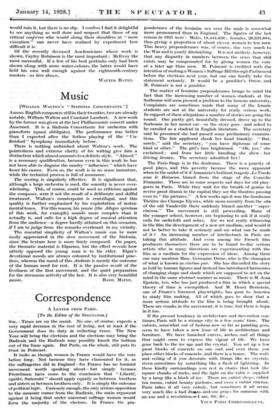Correspondence
A LETTER FROM PARIS.
[To the Editor of the SPECTATOR.] Sia,—Tintes are on the mend. No one, of course, expects a' Very rapid decrease in the cost of living, not at least if the Government does its duty in collecting taxes. The New Year will bring the elections and the elections may bring the Radicals and the -Radicals may possibly knock the bottom out of the franc again. But Paris, on the whole, still puts its trust in Poincare.
• It looks as though women in France would have the vote before long. Not because they have clamoured for it, as the suffragettes did in England—for France has no feminist movement worth speaking about—but simply because Frenchmen have come to the conclusion that " Liberte, • egalite, fraternite should apply equally as between brothers and sisters as between brothers only. . It is simply the outcome of political logic. Curiously enough, the only serious opposition to the measure comes from the-Radicals, the main argument against it being that under universal. suffrage women would form the majority of the electors. In France the pre- ponderance of the &mining sex over the male is somewhat more pronounced than in England. The figures of the last Census in -1921 were: Males, 18,44-4,056; females, 20,352,884, thus giving a proportion of about eleven women to ten men. This heavy Preponderance was, of course, due very much to the War and is yearly diminishing. It is not unlikely, however, that any disparity in numbers between- the sexes that still exists may be compensated for by giving women the vote
at a later age than men. M. Poincare is credited with the intention of rushing a Women's Suffrage Bill through Parliament
before the elections next -year, but one can hardly take the statement seriously. It would be a gambler's throw, and M. Poineare is not a gambler.
The matter of, feminine .preponderance brings to mind the fact that the increasing number of women students at the Sorbonne will soon present a problem to the famous university. Complaints are sometimes made that many of the female students are not at the university for really serious work. In support of these allegations a number of stories are going the round. One pretty girl, beautifully dressed, drove up to the Sorbonne in her motor car—so the story goes—and asked to be enrolled as a student in English literature. The secretary said he presumed she had passed some preliminary examina- tions. The fair applicant shook her head blankly. "But, surely," said the secretary, "you have diplomas of some kind or other." The girl's face brightened. "Oh, yes," she exclaimed ; and from her little handbag she drew—her driving licence. The secretary admitted her !
The Paris Stage is in the doldrums. There is a paucity of good plays, and this poverty became the more apparent when in the midst of it d'Annunzio's brilliant tragedy, La Torehe sous le Boisseau, blazed from the stage of the Comedic Francaise. These are in some respects sad days for old play- goers in Paris. While they wait for the breath of genius to revive great drama in the capital they see the theatres passing over to " the pictures." A few weeks ago it was the handsome Theatre des Champs Elysees, while more recently from the site of the old Vaudeville there suddenly blazed another "super- cinema." The movement is still proceeding. Many of the younger school, however, are beginning to ask if it really calls for sackcloth and ashes. Are we not really witnessing in the film the development of a new art medium, and would it not be better to take it seriously and see what can be made of it ? An increasing number of intellectuals in Paris are taking this attitude. And even among the French film producers themselves there are to be found to-day serious artists who in many directions are experimenting with the film as a medium for the expression of ideas. Among them one may mention Mine. Germaine Dulac, who is the champion of what is known as cinema pur. She has discarded the story as told by human figures and instead has introduced harmonies of changing shape and shade which are supposed to act on the mind in the same abstract manner as music. There is M. Jean Epstein, too, who has just produced a film in which a special theory of time is exemplified. And M. Henri Bernstein, one of France's foremost playwrights, has gone to . America to study film making. All- of which goes to show that a more serious attitude to the film is being brought about. There are cranks in the movement, it is true, but there is hope in it too.
If the present tendency in architecture and decoration con- tinues,- Paris will be a strange city in a few years' time. The cubists, somewhat out of fashion now so far as painting goes, seem to have taken a new lease of life in architecture and furniture. We have banished curves, arches, and all things that might - seem to express the vigour of life. We have gone back to ,the- ce age and the crystal. You set up a few great blocks of concrete on one end, and over them you place other blocks of concrete, and there is a house. The walls and ceiling of it. you decorate with things like ice crystals, riven sometimes by something like a flash -of lightning. In these kindly surroundings you rest in chairs that look like square chunks of rocks, and the light on the table is supplied by a lamp like a block of ice. There are cubist shops, cubist tea rooms, cubist. beauty parlours, and even a cubist cinema. Paris takes it all very calmly, but sometimes it all seems very much like a bad dream, and one prays for someone with an axe and a revolution..--I am, Sir, ofze.,
• YOUR PARIS CORRESPONDENT.


































 Previous page
Previous page